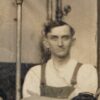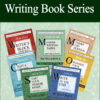
Don’t Worry About a Thing / Katherine Sullivan
Denis Ledoux: At The Memoir Network, we had the pleasure of working with Katherine Sullivan for several years as she edited her memoir, Don’t Worry About a Thing, with one of our editors, Frances King, and focused on book production with Sally Lunt. Because of her insightful articulation of her life experience, I am delighted she agreed to do the following interview (conducted by email.)
Denis: Can you tell our readers—your fellow writers—what your book is about and why you were impelled to write it? What was driving you to spend the time, energy and money to get this book out into the world?
Katherine: Don’t Worry About a Thing is a coming-of-age memoir about life in a small Maine town in the middle of the twentieth century. As a child of a Greek immigrant and a Maine country girl, I tried to find my place in the world. Not all immigrant stories are success stories. I was impelled to write this book to help me find meaning after a childhood spent with a father whose gambling addiction affected every aspect of my life. I searched for answers in an unstable world, and writing was a place where I could question and discover who I was and where I fit in the world. My personal therapy.
Denis: Tell us about your writing process and how long you worked on this memoir.
Katherine: I began actively working on this book in my fifties, so about twenty years, but I knew from when I was a young girl that I wanted to write. There were long breaks when my life in the present got in the way of my writing about the past. I knew though, that I would finish, and to get me motivated during those dry spells, I took writing workshops at various intervals.
[Free Membership required to read more. See below. ]
We'd love to have you access this content. It's in our members-only area, but you're in luck: becoming a member is easy and it's free.
Already a Member?
Not a Member Yet?

22 Memoir-Writing Goals to Jumpstart your Memoir Writing
Do you find yourself wandering along with your memoir writing and not achieving your memoir-writing goals? Do you have a sense that you might have accomplished a bit more writing than you have?
At regular intervals, it is traditional to review how the past went for you and to recommit to goals for yourself for the coming months. (A goal is a wish with action steps and a timeline.) These goals need to be written and reviewed periodically.
Studies have shown that people who set goals in writing have a better outcome vis-à-vis accomplishing what they set out to do. Here’s a report on one such study. (The famous Harvard goal-setting study so many of us have heard of apparently never happened, but the concept of goal setting is clearly important and is explored in the linked article.)
22 Memoir-Writing Goals especially for you!
[Free Membership required to read more. See below. ]We'd love to have you access this content. It's in our members-only area, but you're in luck: becoming a member is easy and it's free.
Already a Member?
Not a Member Yet?

Memories of My Grandfather
My grandfather William Ledoux would be 133 years old were he alive today. I would like to take a moment to honor his life by sharing some memories of my grandfather.
His early years
He was born in Lachine, Québec, on February 17, 1889, the oldest of what would be a family of six children. His mother was 20 and his father 19 at the time of his birth. The family moved from Lachine, then a small town, to Montréal when he was quite young. He grew up in Montréal in an apartment on Papineau Street. Papineau is a major artery today, but in those horse-and-buggy days, it must have been quieter. Two brothers and three sisters followed him in the next 11 years.
My great-grandfather Georges was a blacksmith in those days when there was a big need for blacksmiths. He was however in the last decades of this work as soon the automobile would be coming to replace the horse.
Healing a child
An interesting story about my grandfather’s family was how, in those days, women from the Kahnawake Iroquois reservation on the south shore of the St Lawrence would come to Montréal where they would seek temporary jobs with the women who lived in the apartments. My great-grandmother, a housewife supported by a blacksmith husband, was by no means a wealthy woman. The Indians were even less so. They would come looking for jobs like doing laundry, washing the floor, cleaning out a room.
One day, my great-grandmother Aurélie, had a sick baby on her hands when somebody knocked at the door. My grandmother went to the door to see who it could be. It was an Indian woman seeking employment. My grandmother said, “Oh, I just can’t talk to you now. I have a sick baby. He has just had a convulsion.”
The Iroquois woman asked, “Does madame have any onions?”
My great-grandmother said, “Yes, I do.”
The stranger replied, “Madame, I know what to do for your baby.” The woman entered the apartment and she and my grandmother took some onions and cut them into little pieces and they lay them on the mattress of the bed where they then placed a sheet. They put the child on the sheet. The story has it that the child got better and never had convulsions again.
My own healing
Later on, when I was a baby myself in 1947-1948, I had convulsions. My grandmother who had the story many times from her husband said to my mother, “You have got to place Denis on a bed of onions.”
My mother, being more modern than my grandmother, resisted but, after yet another convulsion, she felt rather desperate to have some remedy to my situation so she said, “Okay let’s do that.”
She and my grandmother sat down and prepared a bag of onions. They lay me on that bag of onions and that was the last time I had convulsions.
Coming Down to the US
In time, my great-grandparents decided that they could not continue their life in Montréal. My great-grandfather had an uncle who lived in New Bedford or Fall River, Massachusetts. This man told my great-grandfather Georges that if he and his family come down to the United States, he would help him to get settled with his family. My great-grandfather decided to take his uncle up on this kind offer and he made his way down to Fall River around 1900.
In Fall River, there were many Canadian immigrants. My great-grandfather spent a decade as a blacksmith but, as time went on, blacksmithing became less and less of a viable occupation. decided to become a mechanic. As a blacksmith, my great-grandfather Georges had many hands-on skills and he decided to become an automobile mechanic. (Many blacksmiths became mechanics.) He had a garage which a cousin of my father told me was the last building on the old road to New Bedford. I have never seen this building but one day I will go down and check it out. My father’s cousin said it was no longer a garage, but when you look at it, you could tell that it had once been a garage.
That is how my grandfather came down to live in the US. My grandparents met on a blind date and were married in 1912. They had five children. I have more memories of my grandfather (and grandmother) elsewhere on this site
My grandfather died on December 23rd 1972. He was a wonderful grandfather and I feel very fortunate to have known him. I have written these memories of my grandfather for family and for you, dear reader. [Free Membership required to read more. See below. ]
We'd love to have you access this content. It's in our members-only area, but you're in luck: becoming a member is easy and it's free.
Already a Member?
Not a Member Yet?

Surviving Childhood Abuse: A Writer’s Experience
Congratulations to Denise Brown on the publication of her book, Transcending Darkness: A Memoir of Abuse and Grace. I recently had the opportunity to interview Denise about her experience writing her book on surviving childhood abuse. I am pleased to share her experience. To read Part 2, click here. To read Part 3, click here.—DL
Denis Ledoux: Can you tell our readers what your book is about and why you were impelled to write it? What was driving you to spend the time, energy and money to get this book out into the world?
Denise Brown: Transcending Darkness is a memoir about the abuse that I experienced during my childhood. Abuse led me on a path of self-destruction. This path encountered God and his mercy in unexpected ways. It sounds like a crazy story, but I began writing my memoir when I was in college after having an incredible dream. An angel brought me to visit three teenage girls who were suffering emotionally. Each of them had been reading a book and were crying. I realized that the book was giving them a glimmer of hope for their futures. Then the angel revealed to me that it was my book that I had not yet written that they were reading, and that I was being given the choice of helping them or not. After that, I couldn’t get the dream out of my head! I began writing what would become Transcending Darkness a few days later.
DL: Can you tell us how long it took from the time you conceived the book to the time you had it published? How many years did you spend in active writing? Were there long breaks in between active writing periods? If so, what happened to get you writing again? Writing about surviving childhood abuse must have been difficult. emotionally
[Free Membership required to read more. See below. ]We'd love to have you access this content. It's in our members-only area, but you're in luck: becoming a member is easy and it's free.
Already a Member?
Not a Member Yet?

Become Good at Memoir Writing
Twice a week or so, the Memoir Writer’s Blog posts a new article. I write about a variety of topics and most of them are not in sequence with what I have written previously. My only logic is to help you become good at memoir writing —better and better with every post.
I write in the Memoir Writer’s Blog as fancy takes me. Most readers, as I am guessing, probably do not prefer to learn in a structured manner and have to wait for the next article in the sequence. What I write today may very well be the very topic s/he needs to keep going even if the memoir writer had not known that before reading the post on The Memoir Writer’s Blog.
There is a way of sequencing the articles to some extent.
Is there a best way to read the Memoir Writer’s Blog?
Read the Memoir Writer’s Blog as a way to create a context for you to delve into your memoir on a given day—today perhaps. Any one of the many posts can serve you as an entry point into the day’s creation.
Perhaps it is early in the morning (or at least it is time for you to write so you are early in your writing period for the day). You turn your computer on, sip your coffee or tea, wonder about your day and about what you might write. You know you are going to write a portion of your memoir—or perhaps it is a memoir you are writing of one of your parents or of your spouse. Soon your RSS feed informs you there is a new post from the Memoir Writer’s Blog. You are not quite ready to start writing so you dawdle a bit and read the post. It is about technique—perhaps on beginning a section or perhaps about creating vivid character. Well, it makes sense and you decide to implement the suggestion. Or…
Perhaps you are feeling overwhelmed. You have been at this writing so long! Is it really worth continuing? You begin reading today’s post. It is a piece of memoir, the piece about when my mother’s aunt left to go back to Canada and suddenly you realize how much you want to tell the story of your aunt who died when you were twelve and how you loved her and you begin to write that. It is out of sequence but you know you can connect it later to the rest of the story. Or perhaps, before you set in to write, you turn to more of the stories of my mother—and are pleased to find so many excerpts from her memoir. You want to see how I have handled her story or perhaps simply to live for a while in another era before you begin to write about your aunt. Or…
Skill-specific posts in the categories help you become good at memoir writing

Perhaps you have been questioning whether you have enough skill in presenting action effectively and you turn to the categories of the blog and, sure enough, you find there a category labeled “action” under technique and you click on it. You discover several articles on how to create more effective action. In fact, you are reminded that action is not synonymous with “interesting” but that action like character and setting has to be better crafted. Or…
Perhaps it is not motivation or craft that is stopping you but the process itself. You have been having trouble with the pre-writing function and you check the blog categories and find several excellent articles on pre-writing and, before you do anything today, you read (or re-read) these articles on The Memoir Writer’s Blog. They ground you, and you move on to the writing you wish to accomplish today.
It is now clear to you that this blog, the Memoir Writer’s Blog, is an effective tool to learn to be a much better memoir writer. You turn to your spouse or perhaps your friend and say, “I’m getting a writing education from the Memoir Network’s blog. That’s why I turn to it whenever I commence to write.”
Then you forward a link to the Memoir Writer’s Blog to someone you know who is writing. You know the post you are alerting your friend to will have the same effect on him/her it had on you.
So that’s how I hope you read the Memoir Writer’s Blog.
What’s in the Memoir Writer’s Blog for you?
1. Regular, even daily, inspiration and motivation to write.
2. Education in both craft and process that will permit you to write the best memoir you are capable of. You can become good at memoir writing.
Become good at memoir writing.
You can, of course, read the Memoir Writer’s Blog for entertainment, as a way of making a diversion for yourself so you don’t have to do the work that is the focus of the Memoir Writer’s Blog, but I hope you won’t do this. It’s not the way to become good at memoir writing.
We usually publish two posts per week on a variety of topics in the Memoir Writer’s Blog. Keep coming and keep checking the categories and tags for topics that will help you to succeed. Subscribe via the FOLLOW at the bottom right of the page where you find this entry. When you do, you will receive a notice of every new post.
Keep writing. Let this be the year you write and publish your memoir.
[Free Membership required to read more. See below. ]We'd love to have you access this content. It's in our members-only area, but you're in luck: becoming a member is easy and it's free.
Already a Member?
Not a Member Yet?

My Mother’s Memoir: Making a Home at the Howe Street Apartment
When my parents came down, they lived in a tenement on Lisbon Street. My father worked at Dulac’s which was nearby, and while the mills were by their tenement, my mother did not seek outside work but kept house.

Memoir Success: Approaching Neverland
Memoir Success
Over the years, I have worked with many writers to help them create and shape their memoirs. It’s my pleasure to bring to your attention once again the success of one such writer: Peggy Kennedy from San Ramon, California, for whom I had the pleasure of providing coaching and editing help that led to her memoir success
Many readers of this blog have been writing for a while and some are despairing of finishing. There is hope. After a number of years of preparation, Peggy Kennedy’s memoir of growing up in a family with a mentally-ill mother, Approaching Neverland, saw print. (Ordering information at bottom.)
While the information below is from over a decade ago, I believe this memoir success story is dateless. Approaching Neverland did well—and so can you. A review in the magazine the Midwest Book Review gave it five stars. Originally fearful of speaking before an audience, she was a guest on a number of radio and television programs. [Free Membership required to read more. See below. ]
We'd love to have you access this content. It's in our members-only area, but you're in luck: becoming a member is easy and it's free.
Already a Member?
Not a Member Yet?

Why I’m Motivated to Write My Memoir? This is how I process life.
I’ve been reflecting on why I’m motivated to write my memoir and realize that I come back to my writing every day because I cannot stay away. It is how I process life. Writing helps me understand what has happened and how I feel about it. My dad’s Norwegian stoicism and our family’s isolation caused by his alcoholism prevented much communication with anybody, in or out of the family. I turned to writing to “talk” to someone. I wrote letters to any relatives and pen pals who would write back, and who I felt were my friends.
As I now write my memoirs, every memory I write about teaches me something new about myself and how I’ve become the person I am. When I started my memoir, I began to forgive myself for self-defeating behaviors I could not overcome. Re-living events buried for years has brought tears, but it has helped me let go and be a less fearful, ashamed, and workaholic person. Writing is the best thing I do for myself.
[Free Membership required to read more. See below. ]
We'd love to have you access this content. It's in our members-only area, but you're in luck: becoming a member is easy and it's free.
Already a Member?
Not a Member Yet?

Book Launch Tips: Business Boy to Business Man, by Robert Verreault
The book launch party was a lovely experience—one that brought to those of us who were involved in creating the book a strong sense of (forgive the overused term!) closure. Writing a memoir is a long haul and it is refreshing to have an event as one might a wedding or a funeral to gather […]
